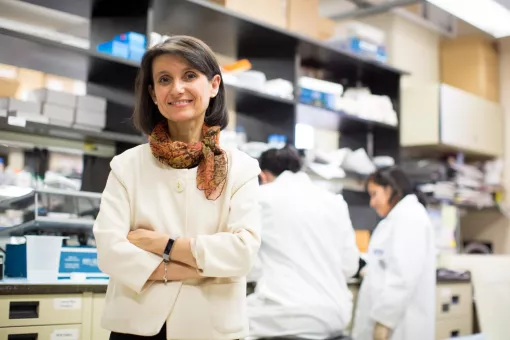Images
ICREA researcher Patrick Aloy starts a 5-year project funded by an ERC Consolidator Grant, awarded by the European Research Council (ERC).
“SysPharmAD” seeks to monitor the onset and progression of Alzheimer’s disease and to discover new therapeutic targets for a disease that affects more than 35 million people worldwide.
25% of the researchers at IRB Barcelona are supported by the ERC, the main European funding agency for research of excellence.
ICREA researcher Patrick Aloy (Barcelona, 1972), at the Institute for Research in Biomedicine (IRB Barcelona), seeks to identify new biomarkers for Alzheimer’s disease through the “SysPharmAD” project, awarded 1.3 million euros by the European Research Council through a Consolidator Grant.
Over the next five years, until 2019, this project aims to monitor the onset and progression of Alzheimer’s disease from its most early stages and to discover new therapeutic targets and chemical compounds able to alter the biology of the disease.
Today the ERC has announced the results of the first call for Consolidator Grants. The ERC has awarded 312 grants, with funding totalling 575 million euros. Spain has received 20 of these grants, 9 of which have been given to researchers in centres and universities in Catalonia.
Regarding IRB Barcelona, six of its scientists are currently funded by the ERC, this figure accounting for 25% of its researchers. In total, IRB Barcelona has 4 Advanced Grants (Batlle –since 2013 Starting-, Orozco, González and Nebreda), 1 Starting Grant (Aznar Benitah), and 1 Consolidator Grant (Aloy). IRB Barcelona researchers have been awarded funding totalling more than 13,5 million euros.
Network medicine to understand and tackle Alzheimer’s disease
“A systems pharmacology approach to the discovery of novel therapeutics in Alzheimer´s disease” is the full title of the project. Aloy will apply a network biology approach, a field that seeks to offer a complete and global view of diseases by studying the relation between the cellular and molecular components involved in a specific problem.
Aloy’s team, formed by 12 researchers, among them postdoctoral fellows, PhD students and lab technicians, “has the capacity to transform research into the origin, diagnosis and treatment of Alzheimer’s disease,” state the European evaluators of the project.
Alzheimer´s disease is the most common form of dementia, with over 35 million people suffering from it worldwide, and it constitutes a personal and societal tragedy of immense proportions. Fifty years of intense research have revealed many key elements of the biology of this neurodegenerative disorder. However, our understanding of its molecular bases is still very limited, and the medical treatments available for this condition are purely symptomatic and hardly effective.
“It is clear that we will not find a solution by concentrating on modifying a single gene and that we should move away from this genocentric perspective towards a more realistic therapeutic strategy based on networks of interconnected genes, what we refer to as systems pharmacology.”, says Aloy. The researchers want to focus on stages prior to the appearance on the symptoms of Alzheimer’s disease, before irreversible brain damage, and to identify new molecular biomarkers to monitor patient response.
First, in order to determine the organisation and relation of the genes and proteins that are altered during the different stages of Alzheimer’s disease, the researchers will collect experimental data at the proteome (protein map) and transcriptome (map of gene transcrips) level in a mouse model of this disease.
They will then build a “network associated with Alzheimer’s disease”, which will include the clinical data of patients, and they will offer a dynamic model to explain the progression of the disease. This model will provide clues as to the best strategies by which to monitor the progression of this condition. Finally, the scientists will design and validate systems pharmacology strategies to simultaneously treat various targets using small molecules, with the aim to modify the biology of the disease.
Brief biography of Patrick Aloy
In 2006 Patrick Aloy became an ICREA researcher at IRB Barcelona, where he heads the “Structural Bioinformatics and Network Biology” group, formed by 12 researchers. He is also a member of the IRB- BSC Joint Programme in Bioinformatics.
In 2000, Aloy obtained a PhD in Computational Biology from the UAB and from the Imperial Cancer Research Fund of London. In the same year he joined the European Molecular Biology Laboratory (EMBL)—one of the main centres of research into biology in Europe—as a postdoctoral fellow. There he worked with Professor Robert B. Russell in the Structural Bioinformatics Group for six years. Dr. Aloy’s research focuses on structural biology.
His group uses high resolution 3D structures to discover the underlying molecular bases of large molecular complexes and cell networks. In collaboration with groups throughout the world, his lab undertakes research projects on Alzheimer’s disease, breast cancer, the relation between stem cells and aging, and the discovery of antibiotics.
Aloy is cofounder and scientific assessor of Anaxomics Biotech SL, a company devoted to the discovery of new drugs, new therapeutic targets and new molecular diagnosis kits. He has published 80 articles in scientific journals, which have received more than 6000 citations, and he has been granted three international patents.
About IRB Barcelona
The Institute for Research in Biomedicine (IRB Barcelona) pursues a society free of disease. To this end, it conducts multidisciplinary research of excellence to cure cancer and other diseases linked to ageing. It establishes technology transfer agreements with the pharmaceutical industry and major hospitals to bring research results closer to society, and organises a range of science outreach activities to engage the public in an open dialogue. IRB Barcelona is an international centre that hosts 400 researchers and more than 30 nationalities. Recognised as a Severo Ochoa Centre of Excellence since 2011, IRB Barcelona is a CERCA centre and member of the Barcelona Institute of Science and Technology (BIST).





